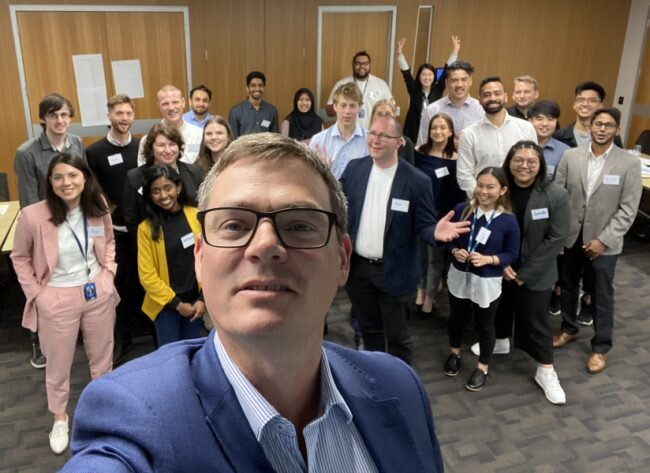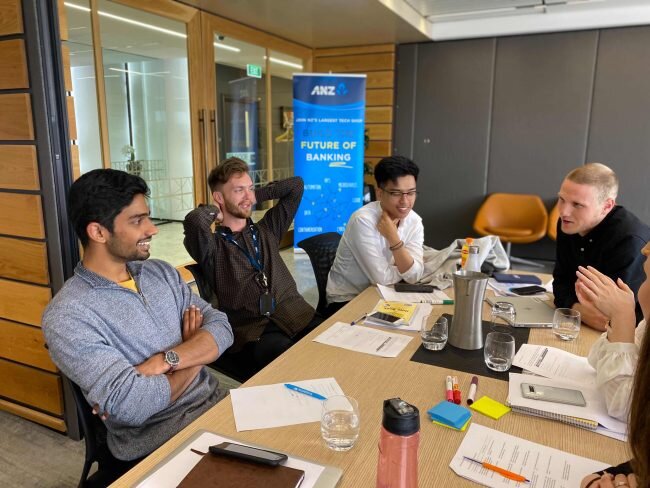ANZ presents: A how-to on effective mentoring
Written by Jeremy Shipman, Lead Engineer for Internet Banking at ANZ
The Summer of Tech internship programme is special for me, because I too was an intern during the very first Summer of Tech, back in 2006, and 2007. There were only 14 of us interns in total, with just a handful of organisations taking part. I was placed at SilverStripe, which was the beginning of my professional career as a software developer. I've stuck with web development ever since, freelancing for 6 years, and now find myself working for ANZ. Recently I moved into a secondment role as a Lead Engineer for the Internet Banking platform. It's cool to have gone full circle and now be sitting on the other side of the table, doing Summer of Tech interviewing and mentoring for the last two years.So in this post, I hope to pass on some useful insights and advice for effective mentoring, and how to create wins for yourself, your organisation and especially your intern.
I've stuck with web development ever since, freelancing for 6 years, and now find myself working for ANZ. Recently I moved into a secondment role as a Lead Engineer for the Internet Banking platform. It's cool to have gone full circle and now be sitting on the other side of the table, doing Summer of Tech interviewing and mentoring for the last two years.So in this post, I hope to pass on some useful insights and advice for effective mentoring, and how to create wins for yourself, your organisation and especially your intern.
First exposure to the real world of work
Remember that interns are arriving with minimal real-world context. This is an opportunity to make the most of.If first impressions matter, then mentors are a key part in showcasing what it's like to work in technology, and within your organisation. It's important to give interns an experience they rave about. They are a walking, talking advertisement for our tech industry, your organisation, and what it's like to work with you.I prefer that interns get to help with the same regular work that we do, rather than being tasked with a special intern project. It's real world work they have been studying for, and probably looking forward to.This is an opportunity to teach a fresh mind the best practices. In most cases, the interns are coming in with little they need to un-learn. Therefore, we can invest in quality learning, helping to set them up for merit-based career advancement.As a mentor, this opportunity is what you make it. What you put into it will not only impact what you get out of it, but also leave that life-long first impression with your intern.
Mentoring as a means of learning
The Feynman Technique suggests that to truly master something, you should be able to teach it to a 12 year old.As a mentor, there could be temptation to think you need to know it all. Maybe you suffer from a bit of imposter syndrome. It's better to be honest with yourself, and take the time to either learn what you may have missed, or perhaps set up some sharing time with some other colleagues who can help fill the gaps for the both of you.Whilst you may have been assigned an intern, remember that your colleagues around you often also want to help out in various ways. Get them involved. Make it a team effort.Mentoring someone is an opportunity for your personal and career growth. We get opportunities to work on our softer-skills like communication, empathy, time management, delegation. There are many skills you can work on in the process of mentoring. Effective mentoring can take time to learn, but it's worth it in the long run.
Enhance your on-boarding process
The beauty of Summer of Tech being an annual event, is that you can continually improve your on-boarding experience.Before your next intake, consider whether you can optimise various activities, such as:
- First setup tasks
- Gaining access to systems and facilities
By making on-boarding activities automatic, and documented self-service processes, you might surprise yourself at how soon an intern can contribute value.There's often lots to learn too, like:
- Why your business exists, and how value is delivered to it's customers
- The architecture of your technologies, and how they are deployed
- Filling some knowledge gaps between their education and your workplace
- Who they should get introduced to
- What is currently being worked on, and why
Reusable resources such as articles, books, interactive training modules, or videos can be helpful for consistency, and allowing things to be learned without requiring all of your time. Don't excuse yourself from the process though.Look for, and take, learning opportunities for your existing colleagues. There may be things that other people have never had the opportunity to learn.You'll want to think about realistic pace of on-boarding, and maybe also break up any necessary monotony. Remember this is all new, so you might want to do certain things all up front to get them out the way, but others you might want to spread out over the coming weeks.Ask for feedback on how they found on-boarding, and listen out for what can still be improved. Feed everything you learn back into your reusable resources, checklists and processes. Your regular hires then also benefit from the improvements you've made. Off-boarding activities can get the same treatment.
Maximising effectiveness
Putting my business hat on, I understand my organisation is paying for interns, so effectiveness is worth thinking about. I think it's fair to say a motivated individual will do a better job than someone unmotivated.Daniel H Pink suggests people thrive in the workplace when they have autonomy, mastery, and purpose. I like this theory of motivation, when compared to the traditional reward-and-punishment style of management.Thinking about these in the context of mentoring:
Autonomy
Give interns plenty of time to figure things out for themselves. Get to know their competency level. Don't micro-manage, but don't leave them hanging when they're stuck.This will help build a sense of responsibility, ownership, pride in what they create.
Mastery
Help them practice what they've been studying the last 3 or 4 years. Build feedback loops that help them learn quickly.When choosing what an intern does, we should aim for flow - things that are not too easy, not too hard. When people are in a state of flow, they are moving along the path to mastery.Encourage good communication by asking them to speak up, ask for help, and state assumptions. Help them not be afraid to try. Enable them to flourish as a worker, and as a person.
Purpose
Give them plenty of reasons why they are doing what they are doing. Give context to their work, explaining how it ultimately helps the customer, and the business.
Create a lasting connection
A great outcome is to be able to work long-term with your fantastic intern. I'm privileged to now have colleagues who were once interns I mentored.If they are not staying on with you, then don’t forget about them. Give realistic feedback on what to keep working on, and support their next steps. Add them on LinkedIn so you can stay in touch.Remember they are taking this first experience of you, your organisation, and NZ tech with them. The New Zealand tech scene is relatively small, so chances are that you may bump into each other again some day.
Summary
There's a lot you can do to make your mentoring experience great for yourself, your intern, and beyond. Those were a few thoughts on how I have tried to do it well, and I know there's plenty more to learn too. Feel free to share any thoughts you have.Finally, I want to say thank you to the Summer of Tech team for all your hard work helping establish students in tech careers (myself included), and for playing a key role in developing New Zealand's technology sector, which benefits us all.
